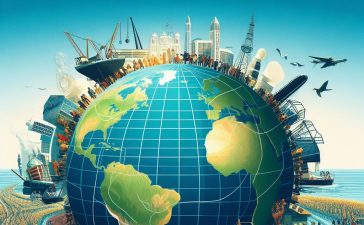The relationship between society and industry is one of the most important drivers of economic growth, cultural development, and technological progress. Industries not only provide goods, services, and employment but also influence social structures, lifestyles, and community dynamics. Likewise, societal needs, values, and trends shape how industries innovate, operate, and expand. Understanding this interconnection is critical for policymakers, business leaders, and communities aiming to achieve sustainable development.
This article explores how society and industry interact, the impact of industrialization on communities, and strategies for aligning industrial growth with societal progress.
The Evolution of Industry and Society
Industries have evolved through multiple phases, from agriculture and manufacturing to service-oriented and technology-driven economies. Each phase has had profound effects on society:
-
Agricultural and early manufacturing eras: These periods established local economies and community cohesion, but labor-intensive work and limited technology constrained productivity.
-
Industrial revolution: Mass production, urbanization, and infrastructure expansion created new opportunities but also led to social challenges, such as labor exploitation and environmental degradation.
-
Information and technology era: The shift toward knowledge-based industries has transformed social interactions, employment structures, and global connectivity.
Modern industries must balance economic growth with social responsibility, addressing both environmental concerns and societal well-being.
Industries Driving Economic and Social Change
Industries play a crucial role in shaping societal development through employment, innovation, and community investment.
Key industries influencing society today include:
-
Manufacturing: Drives economic output, provides jobs, and supports infrastructure development.
-
Technology: Transforms communication, healthcare, and education while creating new sectors and opportunities.
-
Healthcare and pharmaceuticals: Improves quality of life and addresses public health challenges.
-
Energy and utilities: Powers modern life while shaping environmental policies and sustainability efforts.
-
Transport and logistics: Facilitates global trade, mobility, and urban planning.
Industries that integrate social considerations into their operations—such as ethical labor practices, sustainability initiatives, and community engagement—create shared value for both businesses and society.

Industrialization and Social Responsibility
With industrial growth comes the responsibility to mitigate negative social and environmental impacts. Industrialization can lead to challenges such as pollution, resource depletion, and inequality, making corporate social responsibility (CSR) essential.
Examples of socially responsible practices include:
-
Reducing emissions and adopting renewable energy sources.
-
Ensuring fair labor practices and workplace safety.
-
Investing in local communities through education, healthcare, and infrastructure.
-
Developing products and services that meet social needs while minimizing harm.
Industries that embrace social responsibility gain public trust, strengthen their brand reputation, and foster sustainable growth.
Technological Advancements and Society
Technology has become a cornerstone of modern industry, driving efficiency, innovation, and societal change. Industries are adopting technologies to meet consumer demands, improve processes, and reduce environmental impact.
Examples of technological impact include:
-
Automation and robotics: Enhancing productivity while transforming workforce requirements.
-
AI and data analytics: Providing insights into consumer behavior and market trends.
-
IoT (Internet of Things): Connecting devices and systems for smarter operations.
-
Sustainable technologies: Reducing waste and promoting eco-friendly manufacturing.
These advancements not only optimize industrial operations but also affect social norms, lifestyles, and expectations, shaping how society interacts with products and services.
Industry and Employment in Society
Industries are fundamental to employment, providing livelihoods and shaping social mobility. However, technological disruption and globalization have introduced both opportunities and challenges for the workforce.
Trends in industrial employment include:
-
Shift to knowledge-based jobs: Emphasis on digital skills, AI management, and technical expertise.
-
Automation of repetitive tasks: Requiring reskilling and workforce adaptation.
-
Remote work opportunities: Increasing flexibility and access to global talent.
-
Gig economy and contract work: Offering flexibility but raising concerns about job security and benefits.
Education, vocational training, and government policies play critical roles in preparing society to adapt to industrial changes and maintain inclusive economic growth.
Environmental and Social Impacts of Industry
Modern industries must navigate complex environmental and social challenges. Industrial activities can have both positive and negative effects on society:
-
Environmental concerns: Pollution, deforestation, and climate change require industries to adopt sustainable practices.
-
Urbanization and infrastructure: Industrial growth drives city development but can also strain housing, transportation, and public services.
-
Social equity: Industries influence wealth distribution, access to services, and opportunities for marginalized communities.
Balancing industrial expansion with environmental sustainability and social equity is critical for long-term societal development.
Collaborative Approaches Between Society and Industry
To maximize the benefits of industrial growth, collaboration between businesses, government, and civil society is essential. Multi-stakeholder partnerships can drive innovation, sustainability, and social impact.
Examples of collaboration include:
-
Public-private partnerships to improve infrastructure and public services.
-
Industry-funded research programs addressing societal challenges like healthcare and climate change.
-
Community engagement initiatives to understand and meet local needs.
-
Policies incentivizing sustainable production and socially responsible business practices.
Collaboration ensures that industrial development aligns with societal priorities and creates shared value.
Globalization and Industry-Society Interaction
Globalization has expanded the influence of industries across borders, introducing both opportunities and challenges for societies worldwide.
Globalization effects include:
-
Increased access to goods, services, and technologies.
-
Exposure to global labor standards, trade regulations, and ethical expectations.
-
Economic interdependence, leading to resilience but also vulnerability to global disruptions.
-
Cultural exchange, shaping consumer preferences and societal trends.
Global industries must consider societal impacts both locally and internationally to ensure ethical and sustainable practices.
The Future of Society and Industry
The future of industrial development will increasingly prioritize sustainability, ethical practices, and societal well-being. Emerging trends include:
-
Green industry: Emphasizing renewable energy, eco-friendly materials, and sustainable supply chains.
-
Digital transformation: Leveraging AI, IoT, and cloud computing to improve efficiency and reduce environmental impact.
-
Inclusive growth: Ensuring employment and benefits reach diverse social groups.
-
Circular economy models: Reducing waste, reusing resources, and minimizing environmental footprint.
-
Corporate social responsibility: Making social impact an integral part of business strategy.
Industries that embrace these trends will shape a society that is more resilient, equitable, and sustainable.

Conclusion
The relationship between society and industry is symbiotic. Industries drive economic development, employment, and technological progress, while societal values, needs, and trends shape industrial innovation and operations. Balancing industrial growth with social responsibility, sustainability, and ethical practices is crucial for achieving long-term prosperity.
By fostering collaboration, embracing technological advancements, and prioritizing environmental and social considerations, industries can contribute positively to society. The future will belong to businesses that not only pursue profit but also align their objectives with the well-being of communities and the planet.
Understanding the complex interaction between society and industry is essential for policymakers, businesses, and communities to create a sustainable, inclusive, and innovative future.
















